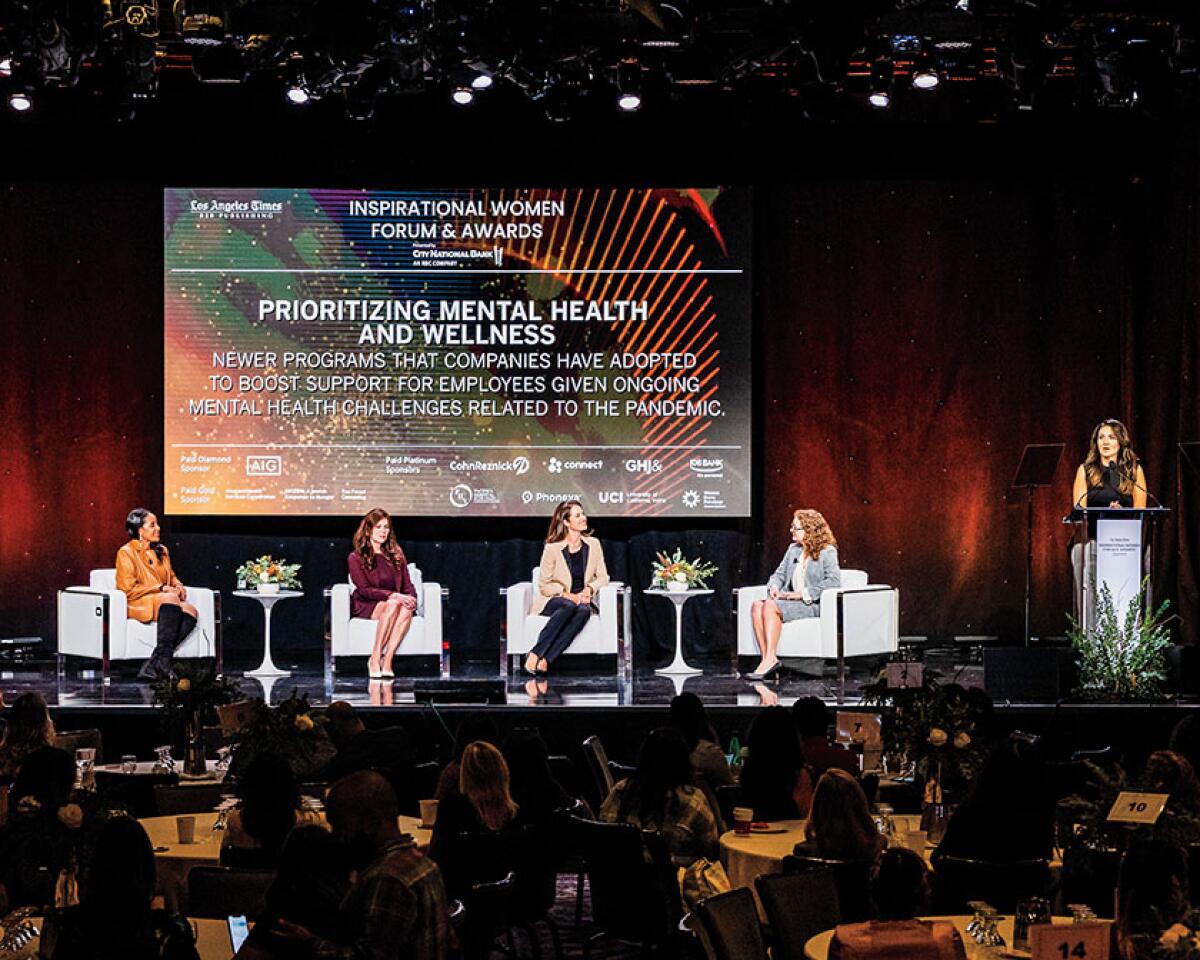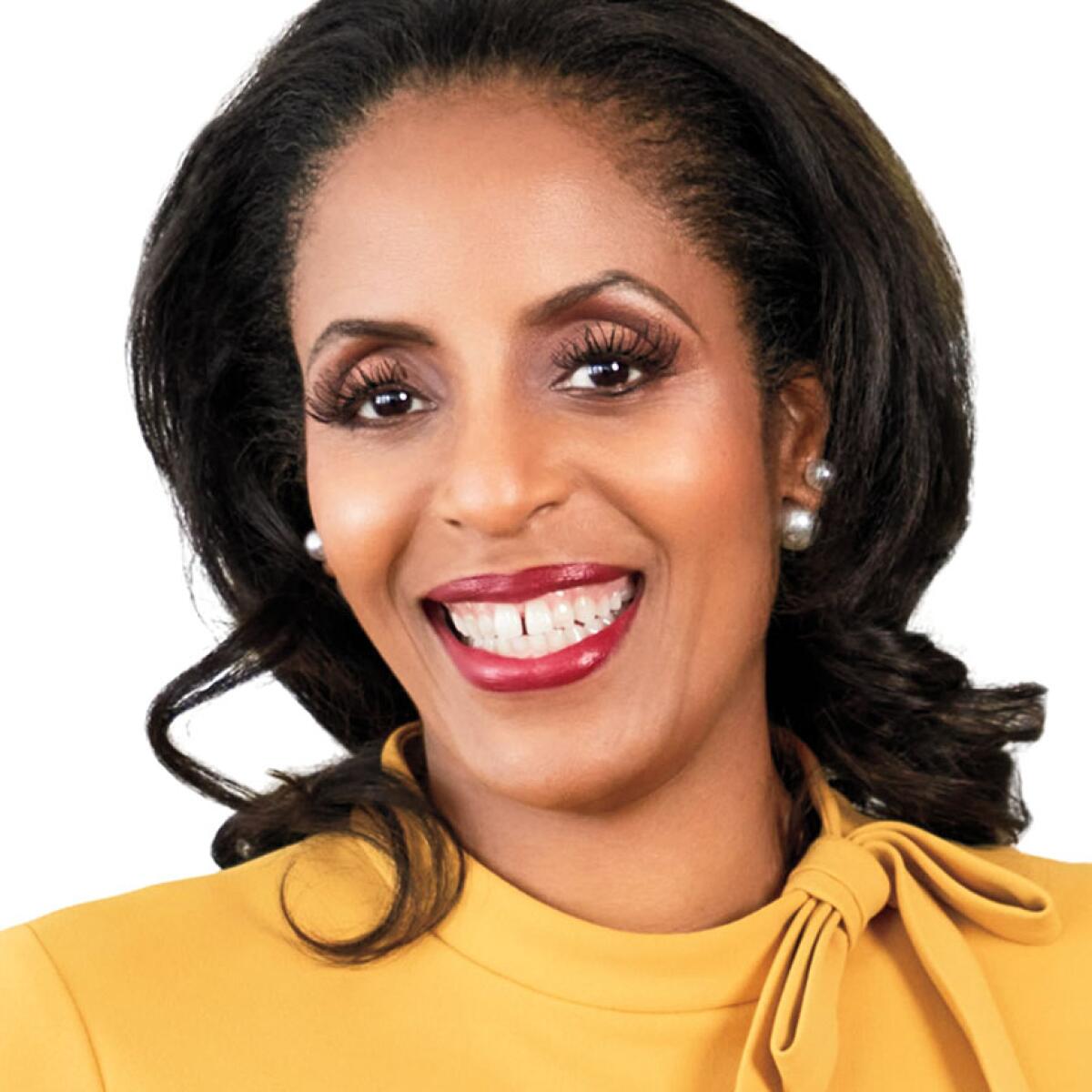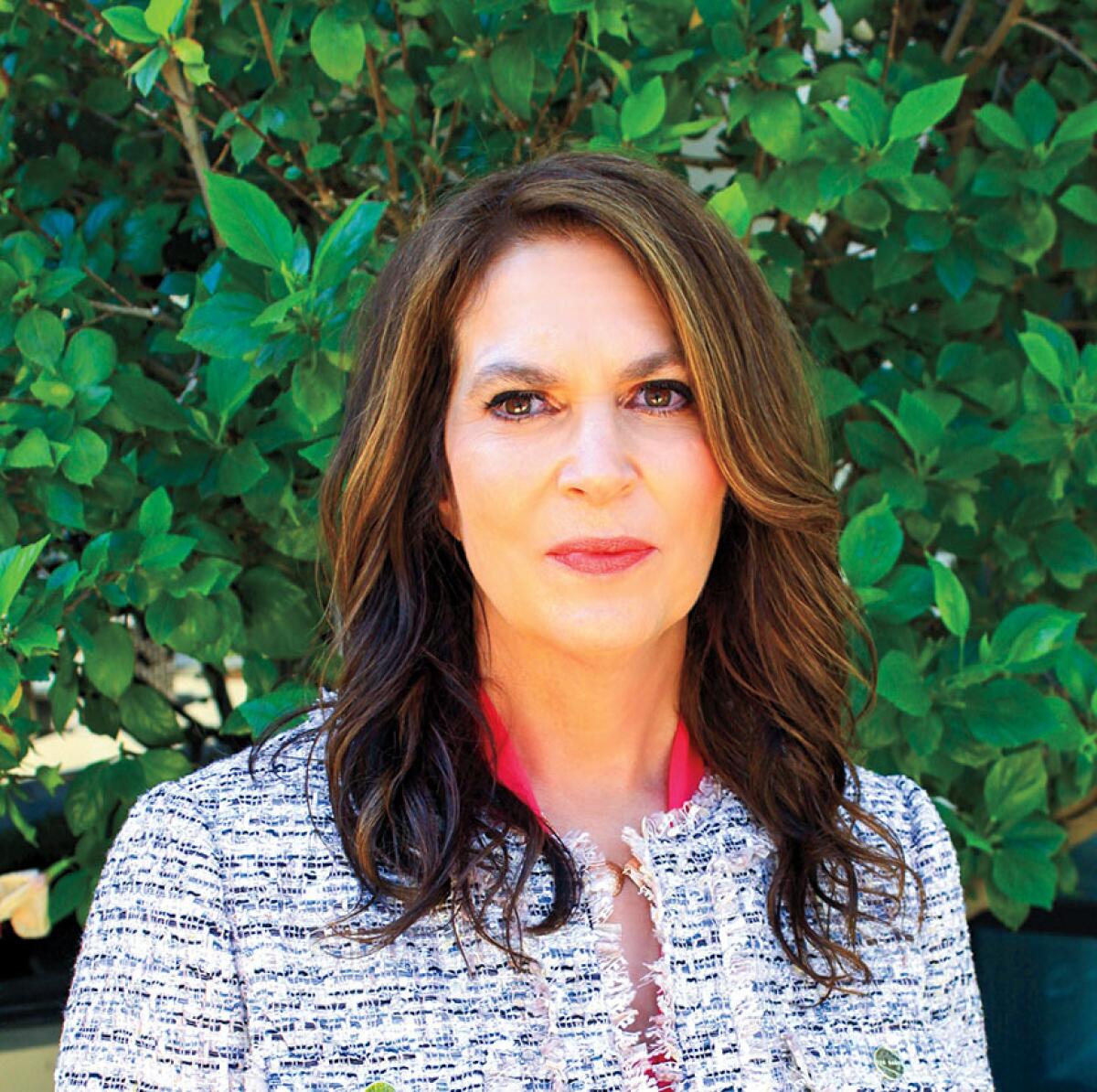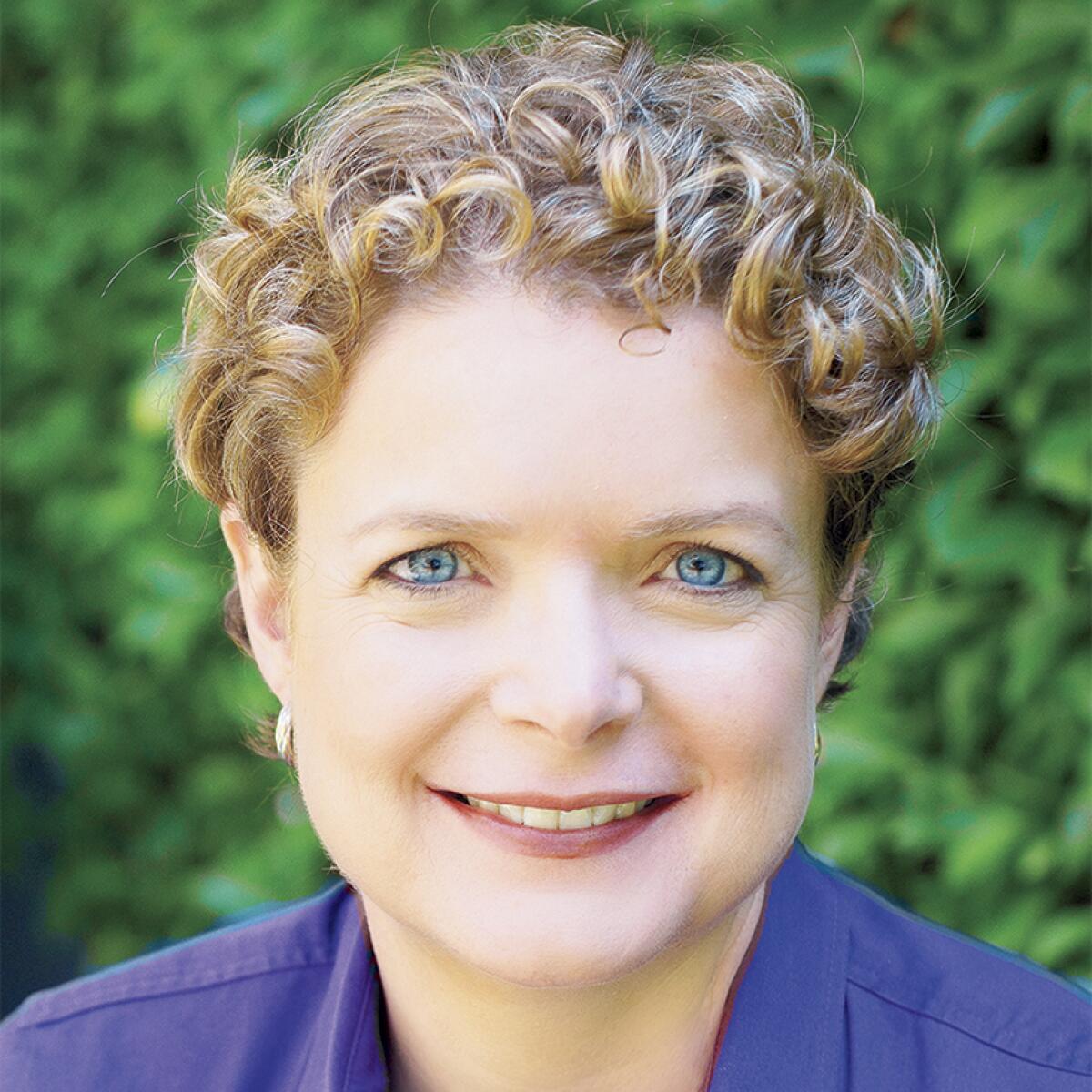Panel: Prioritizing Mental Health and Wellness

- Share via
Due to the turmoil that the pandemic has brought on over the past two-plus years, there has been a greater emphasis on the importance of maintaining employee mental health and wellness. Experts in the field offered their insights on this important topic.
Video from the Panel

Panelists

Panelist: Dr. Zelana Montminy, Behaviorial Scientist & author of “21 Days to Resilience”
Dr. Zelana Montminy is a renowned behavioral scientist, one of Maria Shriver’s Architects of Change, as well as the author of bestselling “21 Days to Resilience.” She has advised and been a keynote speaker for hundreds of industry leading companies such as American Express, KPMG, Bank of America, Capital Group and more, and has partnered with a variety of schools, universities and nonprofits on resilience and wellness programming. An advocate of mental fitness and cultural mythbusting, Dr. Montminy appears regularly on shows such as Access Hollywood, The Today Show and Good Morning America, and also makes ongoing contributions to a variety of editorials.

Panelist: Dr. Thelá R. Thatch, CEO & Founder Thelá – Thatch Consulting
Dr. Thelá R. Thatch is the CEO & founder of Thelá Thatch Consulting. She has over two decades of experience in human resources and talent management, with a focus on building internal cultures and external communities committed to inclusion, equity and belonging. Dr. Thatch is a professor, writer and author of “The Dog Chef,” “Employee Handbooks 101” and “The Diversity Dilemma.”

Panelist: Precious Mayes, President & CEO – Pacifica Hospital of the Valley
As President and Chief Executive Officer, Precious Mayes has the distinction of bringing world-class medical care, including the medical staff team, to a higher level of personalized healthcare that guarantees a standalone standard of care for all residents of San Fernando Valley and Los Angeles County. She has served as chief executive officer of Pacifica Hospital of the Valley since April of 2018 and is very passionate about developing new service lines to support the needs of the surrounding communities. For example, Mayes greenlit a new program in January 2021 with the California Department of Mental Health. This program services behavioral health patients with a primary medical diagnosis with or without COVID-19.

Modeator: Donella Wilson, Nonprofit Practice Leader & Partner – GHJ
Donella Wilson, CPA, leads GHJ’s Nonprofit Practice and is also president and chief philanthropy officer of GHJ Foundation, the company’s vehicle for purposeful and proactive giving to the community. Committed to ending homelessness for women, she served on the Board of Directors of the Downtown Women’s Center for 13 years and is a member of Southern California Grantmakers Audit Committee as well as Southern California Grantmakers Corporate Leadership Council. Wilson obtained a Bachelor of Commerce degree from the University of Cape Town, South Africa, and post-graduate diplomas in accounting and taxation. She enjoys volunteer work, travel and outdoor adventure, with reading and hiking being her favorite pastimes.
Shared Insights
HOW CAN ORGANIZATIONS, FOR PROFIT AND NONPROFIT ALIKE, BETTER SUPPORT THEIR EMPLOYEES’ HEALTH AND WELLNESS? AND HOW CAN THESE ORGANIZATIONS PRIORITIZE WELLNESS TO AVOID BURNOUT LONG TERM?
Dr. Zelana Montminy: New mental health challenges paired with the volatility of the past two years have changed so much about the workplace and what that even means. We can no longer disregard employee mental health. Highlighting employee mental health overall leads to increased productivity, retention, and decreased health care and disability costs. Organizations must prioritize effective strategies and initiatives that bring well-being to the forefront. Ways to do this include making mental health training mandatory and bringing in experts who can tailor content to discuss various tools on how to prevent burnout, manage anxiety and other timely topics.
CAN YOU SHARE EXAMPLES OF PROGRAMS YOUR HOSPITAL HAS IMPLEMENTED?
Precious Mayes: I would like to give you a quick background on Pacifica Hospital. We are a safety net hospital that serves over 14 zip codes. Our primary funding is Medi-Cal providing all components of healthcare to the underserved population. To address our community mental health needs, we have recently opened a new line of service for the community, a Behavioral Health Urgent Care Center in Sylmar, CA. The focus is crisis stabilization for adolescents and adults.
PHRASES LIKE ‘QUIET QUITTING’ AND ‘SHE-CESSION’ ARE COMING UP MORE AND MORE WHEN TALKING ABOUT EMPLOYEE ATTRITION. I’D LOVE IT IF YOU COULD SHED MORE LIGHT ON THESE TRENDS.
Dr. Thelá Thatch: The Great Resignation, also known as the Big Quit, the Great Reshuffle and the Great Reflection, is an ongoing economic trend in which employees have voluntarily resigned from their jobs en masse, beginning in early 2021. According to the Bureau of Labor Statistics, three million women have left the workforce since February 2020. This phenomenon has been called the She-cession.
Dr. Zelana Montminy: While may be a short-term solution, it’s not sustainable for a variety of reasons, namely it doesn’t allow growth within an organization, a sense of purpose or enjoyment, and ultimately creates bitterness and resentment. Companies that are struggling with this, or for those of you who are individually, try to figure out why this is happening, ways you can control burnout, and take ownership for your own growth by speaking up and setting goal metrics. Properly compensate teams, build rapport and close relationships, figure out your non-negotiables and remain flexible on the other things when you can.
HOW DOES DIVERSITY IN THE WORKPLACE IMPACT THE MENTAL HEALTH OF ITS EMPLOYEES?
Dr. Thelá Thatch: When we look at diversity from the lens of the level of diverse representation and programs within an organization, it is the acknowledgment and support of diversity from leaders within an organization that can support a group of belonging and psychological safety that positively impacts the mental health of employees. Psychological safety is critical to ensure that you have a healthy company culture where people feel able to contribute their ideas and be themselves. If people don’t feel psychologically safe, they won’t perform at their best, and productivity and profitability will suffer.
WHAT DO YOU FEEL IS MISSING FROM THE CONVERSATION ABOUT MENTAL HEALTH IN THE WORKPLACE?
Precious Mayes: Approximately 60% of healthcare workers in mental health are women. The burnout rate in general healthcare is significant and escalated more so in the mental health environment. The other impact on burnout is what we call “Compassion Fatigue.” Since the pandemic, this has increased with depression and anxiety. It is critical that as an employer we listen, observe and support our mental health workers for early prevention and coping strategies to minimize burnout.